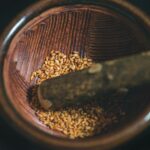Udo no Taiboku (Just a Big Oaf)
Udo no Taiboku
ウドの大木
When I’m looking for Japanese terms to introduce on Lang-8, I can find various indirect expressions that abuse someone.
Lang-8 で紹介する日本語を探していると、さまざまな種類の人を罵る表現が見つかります。
I think that the reason why various indirect expressions were born is because Japanese people tended to say praises and insults indirectly rather than directly.
日本人は褒める際も罵る際も、直接的ではなく間接的に言う傾向があるため、多くの間接的表現が生まれるのかもしれません。
For example, today I found the phrase “udo no taiboku.”
例えば、今日は「ウドの大木」という表現を見つけました。
Udo no taiboku means a person or something that has a big body but is useless.
ウドの大木は、体ばかり大きくて何の役にも立たない人や物を表します。
“Udo” is a kind of plant, “aralia cordata” in English, and its buds are often used as food.
「ウド」は植物の一種で、若芽やつぼみは食用として好まれています。
The udo grows very big like “taiboku,” meaning “big tree,” but then it can’t be used as not only food but also building materials — it will be almost garbage.
このウドは「大木」のように大きく成長しますが、そうなると食用にはならず、柔らかくて建材にもならないため、何の役にも立たなくなります。
From this fact, udo no taiboku has come to mean a useless person or something.
このことから、ウドの大木は役立たずな物や人を指すようになりました。




